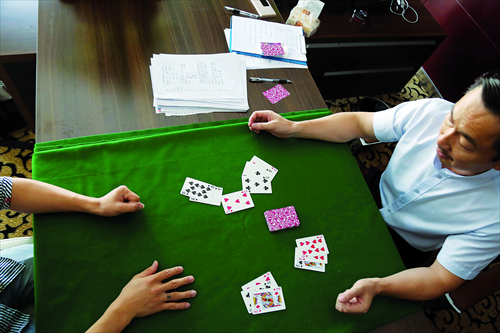HOME >> METRO SHANGHAI
Cheating for good reasons
By Du Qiongfang Source:Global Times Published: 2015-10-19 18:13:01
Unique treatment for gambling addicts available in Shanghai

A fingerprinted handwritten confession from a Chinese gambling addict Photo: Courtesy of Si Guoqi
Forty-year-old Si Guoqi has been traveling the country for the past few years batting gambling addiction with a unique treatment method that involves, among other techniques, showing gamblers how cards, dice and other games can be rigged.
Si Guoqi originally established a center to treat gambling addiction in Chengdu and then he moved the center to Hangzhou, Hohhot and Beijing to help local gamblers and their families. In August, the center was relocated to Shanghai. To date Si has helped some 8,000 gamblers with treatment and counseling.
"Gambling is more harmful to families and society than drug addiction," Si explained. He argues that loan sharks will never loan money to drug addicts but they will loan money to gamblers, no matter how desperate they are. In serious cases this leads to the gamblers selling their homes and businesses and leaving their families homeless.
Thirty-year-old Zhou Xiao (a pseudonym) from Wuxi, Jiangsu Province started gambling in 2008 just after he had graduated from university and before he began working. Within a year he had lost 100,000 yuan ($15,804) to slot machines in illegal gambling dens. At that point he faced up to the fact that he had a problem and confessed this to his businessman father.
More sophisticated
His family moved him to Shenzhen, Guangdong Province where he was given a job in his brother's company. But there he discovered other illegal gambling dens with even more sophisticated slot machines and he started gambling again, losing more than 5 million yuan over the next four years.
The family moved him once again, this time to Shanghai. But Shanghai, he discovered, had even more gambling dens than Shenzhen.
"After years of gambling, I am like a hound dog and can track down a gambling den with ease. I can tell a gambling den just by standing outside it," Zhou told the Global Times.
He knew he had a problem but kept returning to gambling. In a desperate move his family arranged for him to get married back in his hometown. His father gave him a Mercedes-Benz as a wedding gift and arranged for him to be employed at a public institution. But the sudden drop in income meant that he couldn't even afford to buy gas for his new car.
He was searching the Internet one day looking for ways to make more money when he stumbled across a gambling website - and the nightmare began all over again.
He applied for, and was given, five new credit cards. But this was not enough. He borrowed 250,000 yuan against his new car and, secretly, he also borrowed money against his wife's and his father's cars. In one year he had lost 4 million yuan over the Internet.
Things came to a head and his wife, who had been pregnant, had an abortion and filed for divorce.
"You can never be satisfied by gambling. I went crazy in the final period and never thought about consequences. I just wanted to show that I really could make a profit by gambling," Zhou said.

Si Guoqi (right) shows gambling squad police officers how to cheat at cards. Photo: Courtesy of Si Guoqi
Huge blow
The divorce was a huge blow and Zhou became seriously antisocial, staying at home and not going out for nearly a year. He gambled intermittently but remained deeply depressed until a friend of his father heard about this new gambling addiction treatment and persuaded Zhou to try this.
"I didn't believe that I could quit gambling so I did this just to comfort my parents. I thought I was incurable and that Si's methods wouldn't work on me," Zhou said. Zhou went to Si's center in Beijing last December and remained cynical about the process for the first two days. Usually first-phase clients undergo a one- or two-week course but he was told to continue treatment for several months.
This helped persuade him that the treatment might work. "I think he is an honest person. If he had asked me to stay for just 10 days, I would have left. Five or 10 days would not be long enough to stop me gambling. I think he really understood me," Zhou said.
After years of gambling, he had very few friends and was distinctly antisocial. He dreamed of the happy days with his wife but had trouble sleeping and eating. He was in an anxious state most of the time.
But the simple lifestyle regime he undertook at the center began changing him. All those undergoing a long treatment have to rise at 6 am, exercise regularly and go to bed early.
"Most gamblers have bad habits and unhealthy lifestyles. So in trying to get them to stop gambling we try to get rid of their unhealthy life habits first," Si said. Along with the food, sleep and exercise, gamblers at the center have to attend lectures and receive counseling - along with reading classical Chinese literature which is aimed at giving them a better outlook on life and values.
Most gamblers undertake a five- or 10-day course at the center then undergo counseling back at the center at regular intervals. Si believes it takes 22 days to change someone' bad habits and another three months to form good habits. The center keeps in close contact with its gamblers checking on how they are faring after they leave.
One of the key aspects of the center's treatment program is the way it shows gamblers how they can be cheated. Si believes that by showing gamblers how they can be cheated when they think that it is only a matter of chance they discover that they are being manipulated in the games they play.
Treatment at these centers is free - the project is supported by charitable donations.
Before he started this venture Si knew nothing about gambling - he'd never even played mahjong. He ran three hair salons in his hometown in Zhengzhou, Henan Province and in 2003 Si was enjoyed a comfortably annual income of more than 500,000 yuan.
But then he discovered his wife was addicted to gambling and she had lost 1 million yuan from their savings. To help his wife he left his businesses in the town and went searching for treatment and counseling elsewhere.
Learned from experts
It was then he began to discover the cost of gambling addiction and the thousands of families this has ruined. And he learned, from experts, how to cheat at cards.
Si says traditional gambling involved games like poker, mahjong, Pai Gow (Chinese dominos) and dice. The newer gambling forms include electronic gambling, slot machines and Internet games, as well as sports betting.
"It doesn't matter what the game is - I just have to show gamblers how they can be cheated," Si says.
He can deal a new pack of cards in a poker game and ensure that players will get either winning or losing hands. "Honestly these skills have not been easy to master. I wouldn't have known I could do this had I not become involved in fighting gambling addiction. I never played poker or mahjong before, let alone gambled. But I picked up how to cheat quickly," Si said.
"This is like conjuring. The big difference is that conjuring makes people laugh while cheating makes people cry."
This skill, however has also meant that some gamblers try to be accepted at the centers so that they too can learn how to deal cards like this, rather than have their addiction treated.
To sort these clients out, Si's centers only accept gamblers who come for help with their families. "If you learn these card skills you have to have the morals to go with them. If you try to make money this way and you are found out to be cheating you can lose your life. If you are not found out you cause others to lose their money which can wreck their home lives."
There's another reason the centers insist on families attending with gamblers - gamblers do not like revealing to others exactly what they have been doing. And family cooperation is very important to help in this treatment method. "One reason why most gamblers start gambling again after giving it up is because the family doesn't handle this properly. Some families abuse the gamblers because they have had to then pay off the debts incurred. Then, after that, the gamblers want to prove they can win back all the money and so they start gambling again," Si said.

Si shows his card sharp skills to a gambling addict. Photo: Courtesy of Si Guoqi
Similar addictions
Zhang Zhenyu, a psychologist with the Shanghai Psychological Society, explained that a gambling addiction was similar to a child's addiction to Internet games or an adult's addition to mobile phones. "At the moment, there's no particularly effective method to treat these additions. This method is effective for some gambling addicts, but it is not necessarily effective for seriously addicted gamblers.
"These addicts will only stop gambling because they have changed their attitudes toward gambling - this is what we call a cognitive change in psychology. A change like this affects a person's emotions and behaviors. This method can work but it is only effective for light and medium addictions," Zhang said.
There are very few mental health departments in Shanghai that offer to treat gambling addicts.
"Treating serious gambling addiction is very difficult and very few hospital departments offer treatments. From the point of view of medical resources, it costs a great deal to cure this addiction. Most medical institutions are not interested in offering this sort of treatment. And because the success rate is very low, it doesn't give the medical staff any sense of achievement. Although some institutions claim they can treat and cure additions like computer game addiction, there's no scientific proof to support their claims," Zhang said.
Certain areas
Si thinks gambling is more serious in highly developed areas like Shanghai, Zhejiang and Jiangsu provinces as well as in underdeveloped places like Inner Mongolia and the Xinjiang Uyghur autonomous regions.
And gamblers come from all walks of life and include entrepreneurs, civil servants and senior academics. Si said the common link is that they are all highly confident and want to control their lives.
"Most of the gamblers who lost large sums of money are smart people with a great deal of social standing. They made their money through their own intellect. It's very difficult to convince these people they are mistaken or that they need help.
"Many people still regard money as their highest goal in life. This attitude will always cause problems," Si said.
Posted in: Metro Shanghai, City Panorama